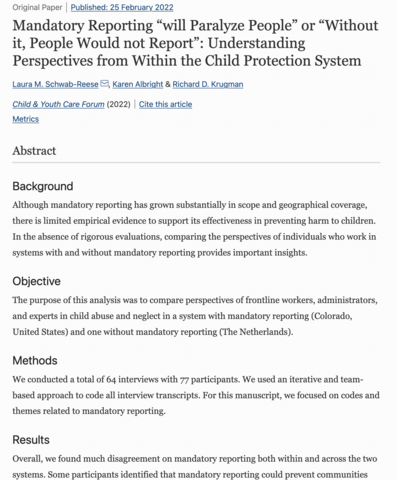Background
Although mandatory reporting has grown substantially in scope and geographical coverage, there is limited empirical evidence to support its effectiveness in preventing harm to children. In the absence of rigorous evaluations, comparing the perspectives of individuals who work in systems with and without mandatory reporting provides important insights.
Objective
The purpose of this analysis was to compare perspectives of frontline workers, administrators, and experts in child abuse and neglect in a system with mandatory reporting (Colorado, United States) and one without mandatory reporting (The Netherlands).
Methods
We conducted a total of 64 interviews with 77 participants. We used an iterative and team-based approach to code all interview transcripts. For this manuscript, we focused on codes and themes related to mandatory reporting.
Results
Overall, we found much disagreement on mandatory reporting both within and across the two systems. Some participants identified that mandatory reporting could prevent communities from intervening, damage therapeutic relationships, and be overly intrusive to families. Others thought mandatory reporting was a meaningful way to increase the identification of maltreated children and reduce the burden on individuals and systems outside of child protection. Individuals’ perspectives on local communities as either a partner in responding to maltreatment or as a conduit for referrals shaped their opinions.
Conclusions
Evaluation of the outcomes of mandatory reporting policies is critical, and our work highlights factors to consider when implementing or modifying mandatory reporting policies and practices.

